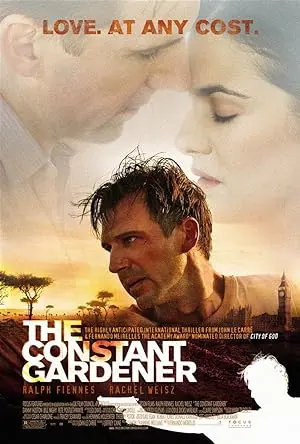 © Production Company
© Production Company
The Constant Gardener: Politieke Intriges en Persoonlijke Verlossing in één Meesterwerk
"The Constant Gardener," directed by Fernando Meirelles and released in 2005, is a compelling adaptation of John le Carré's 2001 novel of the same name. This film stands out not only for its gripping storyline but also for the way it tackles sensitive political issues, blending them with a profound exploration of human relationships.
Plot Overview
At its core, "The Constant Gardener" is a political thriller wrapped in a love story. The narrative follows Justin Quayle, a British diplomat in Kenya, played by Ralph Fiennes, whose wife, Tessa (Rachel Weisz), is found murdered under suspicious circumstances. As Justin delves into the mystery surrounding her death, he uncovers a web of corruption involving multinational pharmaceutical companies conducting unethical drug tests on impoverished Africans. The film is both a critique of global capitalism and a poignant tale of personal loss and redemption.
Performances and Direction
Ralph Fiennes delivers a reserved yet powerful performance as Justin, a man initially uninterested in his wife’s activism, who gradually becomes deeply involved in seeking justice. Rachel Weisz, whose performance earned her an Academy Award for Best Supporting Actress, brings depth and passion to Tessa, whose commitment to exposing corporate malfeasance drives the narrative forward even after her death.
Fernando Meirelles, known for his work on "City of God," brings a dynamic visual style to the film, employing handheld cameras and fast-paced editing to convey the urgency of the situation. The film’s cinematography, by César Charlone, captures the stark contrasts of Kenya's landscapes, juxtaposing the beauty of the environment with the grim realities faced by its inhabitants.
Themes and Analysis
"The Constant Gardener" is not just a political thriller; it is also a meditation on grief, love, and moral responsibility. The film raises important questions about the ethics of global capitalism, particularly how Western corporations exploit developing countries. It also delves into the personal journey of a man who, through the loss of his wife, finds a cause worth fighting for.
The movie's depiction of Kenya is both beautiful and haunting, highlighting the disparity between the lives of expatriates and the local population. The score, composed by Alberto Iglesias, further enhances the emotional weight of the film, blending African rhythms with classical compositions to create a unique soundscape that underscores the film’s themes.
Critical Reception
"The Constant Gardener" received widespread acclaim upon its release. Critics praised its intelligent script, strong performances, and Meirelles' direction. On Rotten Tomatoes, the film holds an impressive approval rating, reflecting its critical success. Audiences were also moved by the film's emotional depth and its unflinching portrayal of corporate exploitation.
OmniGuide Rating: ★★★★☆ (4/5)
"The Constant Gardener" is a gripping and emotionally resonant film that expertly balances political intrigue with human drama. Its powerful performances and thought-provoking themes make it a must-watch for fans of intelligent thrillers. However, its heavy subject matter and intense emotional moments may not appeal to all viewers, which is why it earns a solid four out of five stars.